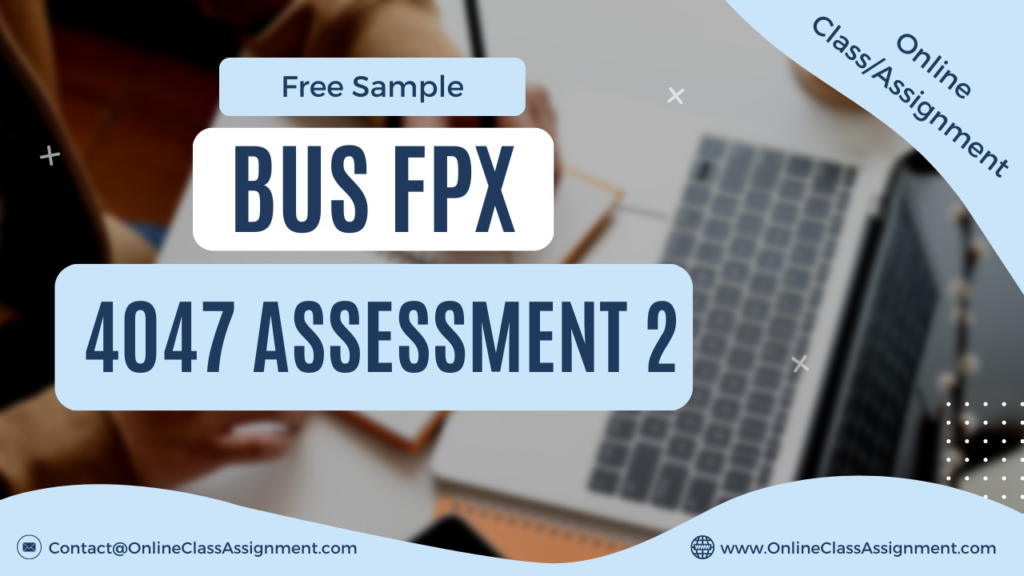
BUS FPX 4047 Assessment 2 Creating Training Objectives and Course Design
Student Name
Capella University
BUS-FPX4047 Employee Training and Development
Prof. Name
Date
Introduction
Sales training is crucial for the success of any organization as it equips sales professionals with the essential skills and knowledge to effectively engage customers, close deals, and drive revenue (Doerr, 2022). This paper aims to outline the training objectives and design considerations for a hypothetical sales training course tailored for both new hires and experienced sales representatives, with the goal of enhancing their sales proficiency and aligning them with the company’s sales strategies.
Training Objectives
Product Knowledge Enhancement
Objective: To ensure all sales professionals possess a comprehensive understanding of the company’s products and services.
Rationale: A robust product knowledge enables salespersons to provide valuable information to customers, address objections, and articulate product benefits effectively.
Measurement: Assessment scores on product knowledge quizzes, improved articulation of product features during role-play exercises (Doerr, 2022).
Sales Process Mastery
Objective: To equip sales professionals with a structured and effective sales process guiding them from prospecting to deal closure.
Rationale: Standardized sales processes ensure consistency, facilitate lead tracking, and mitigate lost opportunities.
Measurement: Role-play assessments demonstrating the application of the sales process, lead movement time through the sales funnel.
Communication and Interpersonal Skills
Objective: Development of robust communication and interpersonal skills to foster effective client relationship building.
Rationale: Trust and rapport are pivotal in sales; hence, effective communication skills aid in understanding customer needs and fostering lasting relationships.
Measurement: Peer and manager evaluations, customer feedback, and satisfaction ratings.
Handling Objections and Negotiation
Objective: Training sales professionals in identifying and addressing customer objections and negotiating deals effectively.
Rationale: Skillful objection handling and negotiation contribute to higher conversion rates.
Measurement: Role-play scenarios demonstrating objection handling, improvement in conversion rates and deal sizes (Doerr, 2022).
Sales Technology Proficiency
Objective: Ensuring proficiency in utilizing sales technology stack, including CRM systems and sales analytics tools.
Rationale: Sales heavily rely on technology for lead management, data analysis, and customer relationship management.
Measurement: Proficiency assessments for sales tools, increased utilization of sales technology in daily activities.
Design Considerations
Audience Analysis
Before course design, conduct thorough audience analysis to comprehend participants’ knowledge levels, experience, and learning styles.
Customized Content
Tailor course content to participants’ needs, incorporating modules for beginners and advanced segments for experienced sales reps.
Engaging Learning Methods
Utilize interactive workshops, role-play exercises, online simulations, and real-life scenarios to keep participants engaged.
Continuous Assessment
Implement ongoing assessments like quizzes, role-play evaluations, and practical exercises to gauge progress and identify areas for improvement (Miller, 2023).
Experienced Instructors
Select instructors with expertise in sales and training, ensuring strong teaching and facilitation skills.
Role-Playing and Simulation
Incorporate role-playing exercises and simulations mirroring real sales scenarios for practice and improvement.
Feedback and Coaching
Provide regular feedback and one-on-one coaching sessions to address challenges and foster a collaborative learning environment.
Technology Integration
Integrate sales technology into training, utilizing CRM systems and sales analytics tools for exercises and simulations (Gargano, 2023).
Post-Training Support
Offer post-training support through job aids, reference materials, and access to a knowledge base.
Evaluation and Iteration
Conduct evaluations post-training to measure effectiveness, gather feedback, and make necessary adjustments for future iterations.
Conclusion
A well-designed sales training course, with clear objectives and thoughtful considerations, serves as a significant asset for any organization, empowering sales professionals to excel in their roles and contribute to the company’s success. Continuous investment in sales team development ensures competitiveness and prosperity in the ever-evolving sales landscape.
References
Doerr, J. (2022, November 17). Want the best sales training? Focus on these 9 outcomes. RAIN Group Sales Training. https://www.rainsalestraining.com/blog/want-the-best-sales-training-focus-on-these-9-outcomes
Gargano, D. (2023, March 2). https://www.business.com/articles/sales-process/. https://www.business.com/articles/sales-process/.
Miller, E. (2023). What is Sales Training? https://salesethics.net/blog/what-is-sales-training
BUS FPX 4047 Assessment 2 Creating Training Objectives and Course Design
Get Capella University Free Business Samples
BUS FPX 3007
BUS FPX 3011
BUS FPX 3021
BUS FPX 3022
BUS FPX 3030
BUS FPX 3040
BUS FPX 3050
BUS FPX 4012
